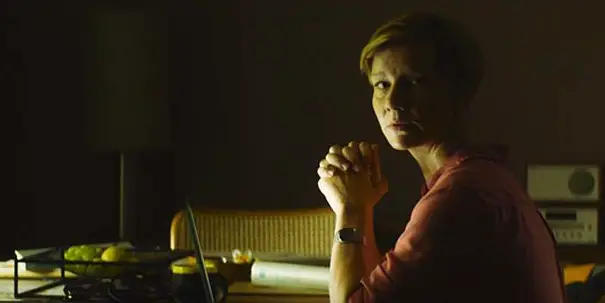EUFF 2020: EXILE: Portrayal of Xenophobia, Deceived

Ram is an independent film critic trying to combine his…
Exile, filmmaker Visar Morina‘s sophomore effort, is what I’d call a truly deceiving film. Bear in mind that there aren’t mind-boggling twists here. For that matter, considering the minuscule drama or action in it, I wonder what the script of the film might have looked like. There were multiple instances when I felt chopping off the long walks in office corridors, the silences in conversations, and stares between characters would have reduced the run time by a quarter. That was petty of me. Perhaps, you will feel the same as well. However, it’s all in the waiting, the outwards taciturnity, the emptiness, and the mundanity of everyday life. These are the determinants that foster your perspective of the story.
Provocations of trivial yet never-ending racism
We are put in the shoes of Xhafer (played by an equally deceiving, pitiful Mišel Matičević) a Kosovar working in Germany. The trouble starts with his name. Some pronounce it as Jafar while others go by Xavar. Despite spending years in Germany, Xhafer feels he is branded an outcast by his colleagues at the chemical firm he is employed in. In one of the team meetings, the boss speaks of the vitality of integrity among members of the organization – standard emotionless corporate uplift – citing that they spend more time surrounded by colleagues than their family members. This is Xhafer’s biggest challenge. He is convinced that he is an outsider in his firm, and we cannot disagree either. His colleagues are… cold, indifferent, and ignorant of Xhafer.

We wish they were kinder and empathetic. Multiple shots foreshadow his loneliness by dimming the space in his physical proximity to create an illusion of him being inside a box in a dark space. The screenplay is built on the everyday acts, filled with recurring scenes of the protagonist being cornered. When the film opens, the conflict is set way beforehand. Xhafer is excluded from the office mailing list that prevents him from attending a meeting on time. Xhafer is unaware of an official trip being planned. His colleague, Urs, ignorant of him, paying no heeds to his words. His personal life, too, is taking a toll due to his insecurity. In the opening moments, we see his wife Nora (Sandra Hüller, restraining from expressing obvious emotional beats of a spouse with burgeoning tiresomeness, with ease) with a younger co-worker, and he grows paranoid about a possible affair. On the other hand, Xhafer is in a loveless sexual relationship with an Albanian Janitor in his office, nudging at the double standards.
Perspectives can be deceitful
For the most part, we see what the main character wants us to, resulting in one and a half hours of slow-burn drama that makes us impatient for the point where mental trauma finally transmutes into physical consequences. Something of that sort of does happen – involving imagery that is sure to gross out viewers with rat phobia, like Xhafer does – but it isn’t the kind of vigilante justice that one might root for. Undoubtedly, we want to see Xhafer earn the respect that he deserves, but the third act turns the tables around, by questioning the accuracy of the worldview we have built until that point through the protagonist’s perspective. This is when we realize that the world, surprisingly, is not as aloof as Xhefer painted it for us.

By exposing the deceiving prism of echelon, through the tiny character of the foreign janitor, the film breaks the indifference channeled towards Xhafer. However, it doesn’t discredit petty racist acts the protagonist has been subjected to. Racism is racism, regardless of its degree, but the film talks about how it affects people belonging to different classes. And it is done masterfully by acknowledging his privilege – both social and economical – by shifting focus towards the insignificant janitor, whose employment and citizenship, are at stake. The ending has ‘we are not in the same boat, we are in the same storm’ written all over it, and once again, we cannot disagree. It’s a film that manipulates and plays with our perspective, at times deceiving and sometimes, making us feel we are the bullies. All of this is accomplished by marrying simplistic, straightforward story-telling with terrific performances.
Exile: Conclusion
Exile requires a certain level of investment to procure the fruits of the third act, but will certainly leave you introspecting your life, provided you even remotely empathize with Xhafer.
What are your favorite psychological dramas? Let us know in the comments below.
Watch Exile
Does content like this matter to you?
Become a Member and support film journalism. Unlock access to all of Film Inquiry`s great articles. Join a community of like-minded readers who are passionate about cinema - get access to our private members Network, give back to independent filmmakers, and more.
Ram is an independent film critic trying to combine his love for films and writing, to give readers something more than just an opinion.













